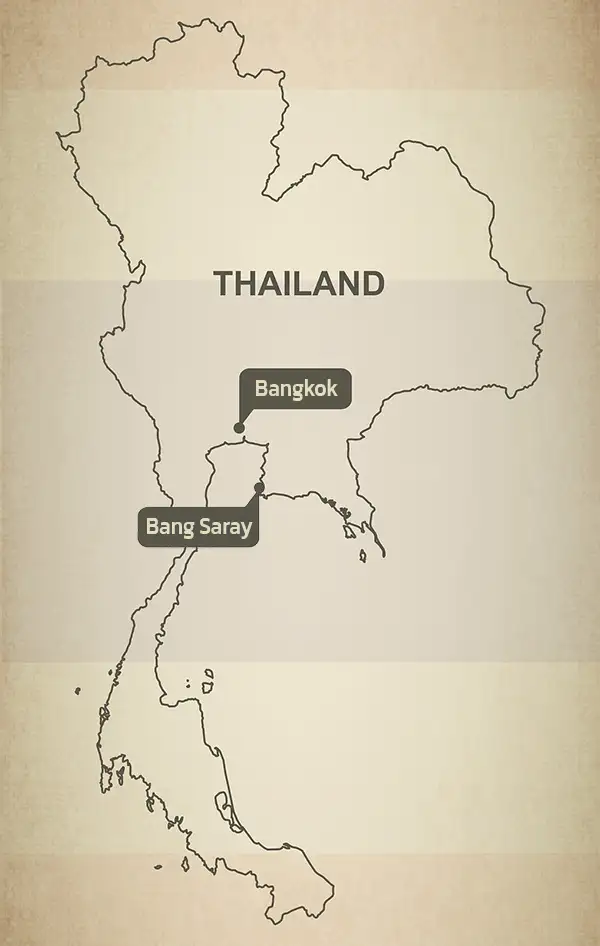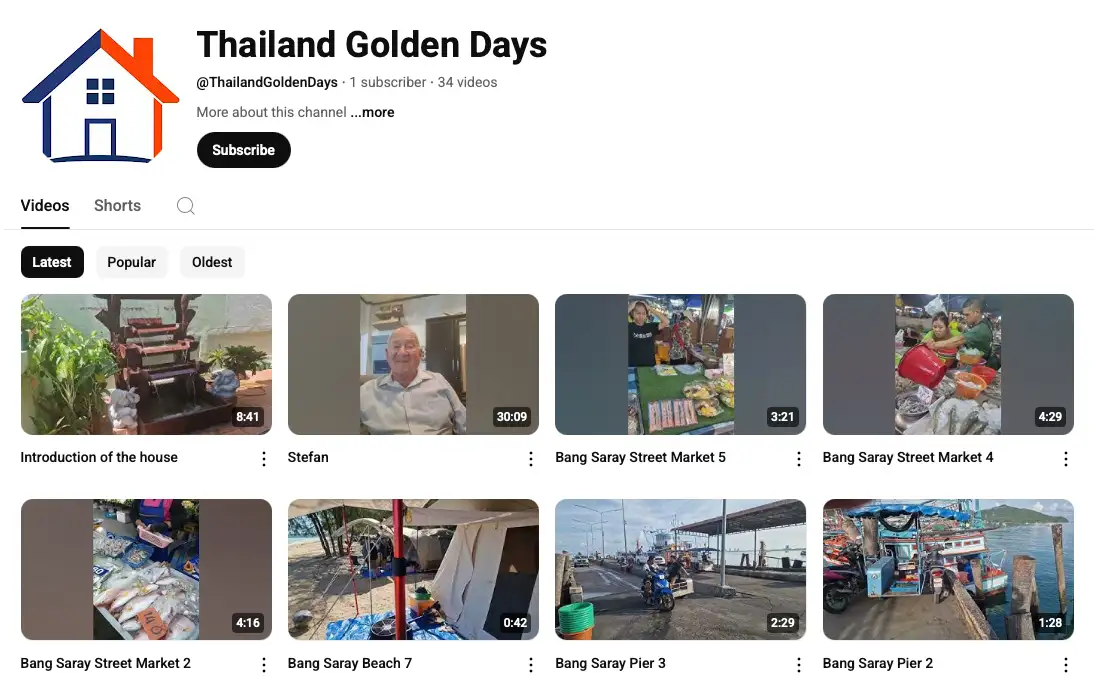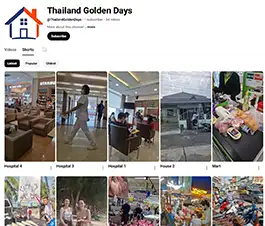About Thailand
About Thailand

Thailand,officially the Kingdom of Thailand and historically known as Siam (the official name until 1939),is a country in Southeast Asia on the Indochinese Peninsula. With a population of almost 72 million(2024). Thailand is bordered to the northwest by Myanmar, to the northeast and east by Laos, to the southeast by Cambodia, to the south by the Gulf of Thailand and Malaysia, and to the southwest by the Andaman Sea; it also shares maritime borders with Vietnam to the southeast and Indonesia and India to the southwest.
Your Content Goes Here
Thailand 🇹🇭
-
Capital: Bangkok
-
Language: Thai
-
Area: Approx. 510,000 km²
-
Population: Approx. 71.89 million (2024)
-
GDP: Approx. 548.89 billion USD
-
Currency: Thai Baht (THB)
-
Country Code: +66
Thailand has a hot and humid tropical climate. The year is divided into three seasons:
-
Hot season (March to May)
-
Rainy season (June to October)
-
Cooler season (November to February)
The average annual temperature is 28°C, with highs of 32.5°C and lows of 23.7°C.
The average annual rainfall is approximately 1,600 mm.
Bang Saray is a peaceful town with a population of 25,000, located 1 hour and 40 minutes (135 km) from Suvarnabhumi Airport.
Many foreigners live in Bang Saray, and the Thai people are friendly.

Cost of Living Guide
Unit: Thai Baht (THB)
◀️ Slide to the left to view the list.
| Private House | Apartment | Grocery Cost | Home Internet | Mobile | Electricity | Water | Big Mac |
|---|---|---|---|---|---|---|---|
| 25,000-60,000 | 10,000-20,000 | 5,000-10,000+ | 400-800 | 200-800 | 1,000-5,000 | 200-600 | 149 |
| BarBer Shop | Thai Massage | Petrol | Coffee | Noodle | Beer (In a bar) | Drink Water | Breakfast |
|---|---|---|---|---|---|---|---|
| 150-250 | 200-300 | 30-33 / 1 liter | 50-120 | 40-60 | 50-100 | 8-15 | 70-110 |
At Retirement Living Thailand we offer the most complete service for foreign national considering full or part time retirement in Thailand.
How Much Does It Cost to Retire in Thailand in 2025?
Whether you have family in Southeast Asia or are purely looking to move to paradise, Thailand is a popular retirement destination — and for good reason. The low cost to retire in Thailand means your savings will stretch further. Friendly locals and a large expat community ensure you’ll feel at home. Warm weather year round means you can make the most of Thailand’s stunning beaches. If the heat gets too much, you can always escape to the mountains. World-class medical care, a rich culture, incredible food, and luxury services at a fraction of Western prices are just a few other draws of the Kingdom.
However, information about retiring in Thailand can be misleading. Plenty of blog articles talk about living in Thailand for under $1,000 per month. While it may be possible to retire on a very small budget, you will miss out on a lot of modern conveniences.
This article provides a realistic cost of living in Thailand, assuming you want to live at or above the standards you are used to in your home country and spend some time traveling around beautiful Thailand.
All costs are in Thai baht ($1 ≈ THB34). For consistency, all prices are stated at a monthly rate, unless specified otherwise.
To check if you’re eligible to retire in Thailand, read our guide to Non-immigrant O Visa options for over-50s. For help obtaining your visa, head to our Thai retirement visa services page. For the most recent updates please subscribe to our YouTube Channel.
Housing costs
Your housing cost in Thailand is likely to range from THB10,000 to THB50,000+ ($340 to $1,700) per month.
Moving to Thailand to take full advantage of luxury living at a lower cost? Accommodation upwards of THB 80,000 will deliver. Compared to many other retirement destinations around the world, Thailand delivers a lot of luxury for relatively less cost. On top of hotel-style amenities and concierge staff, this band of housing offers expansive rooms, often with stunning views, and world-class materials and appliances. It also often comes with added bonuses like coworking spaces and rooftop lounges.
Utilities costs
When people talk about the cost to retire in Thailand, they seldom factor in utility costs. Depending on the size of your property and your air conditioning usage, expect to pay between THB2,000 and THB5,000 per month for utilities. This cost is made up of various elements.
Wi-Fi usually costs between THB400 and THB800. High-speed internet is inexpensive and available throughout the country from multiple providers. In many condos, you will be expected to set up your own Wi-Fi, which comes with installation costs. Always check Wi-Fi speed and availability before signing a lease.
Electricity costs can be highly variable and likely to set you back between THB1,000 and THB5,000. Your A/C use will be the biggest factor. In some condos you will have to pay your bills directly yourself, while in others, it will be added to your monthly rental bill. Be wary that, although technically illegal, some older properties charge above the government rate for electricity. It is advisable to check this before signing your contract.
Water typically costs between THB200 and THB600 per month. Some condos have fixed monthly water rates, like THB500 no matter your usage, while houses and apartments are typically metered and the cost depends on your usage. It is not recommended to drink water from the tap, but some condos provide a communal filtered water dispenser for a small fee. Alternatively, there are popular bottled water delivery services available at relatively modest cost.
Mobile phone and data packages are high quality and good value in Thailand. It is possible to find contracts with unlimited data for between THB200 and THB800. Coverage is generally excellent.
Food costs
The cost of food in Thailand depends heavily on your willingness to adapt. While good-quality local food is far cheaper than “Thai food” in your home country, imported food is typically much more expensive than in its origin country. For this reason, food costs can range between THB5,000 and THB10,000+ per month.
Dining out in Thailand runs the gamut, especially in Bangkok, other major cities and beach resorts. A street food meal from a vendor’s cart or a food court costs as little as THB30–60. A meal in a mid-level restaurant typically ranges from THB80–300. Dining in a luxury restaurant will set you back upwards of THB500+. International hotel restaurants will cost international-standard prices. Bangkok is also home to Michelin-starred restaurants and omakase counters that charge as much as THB3,000–12,000 per head.
If you eat foreign food frequently and don’t adjust to the local cuisine, you’re likely to burn through your budget more quickly. The good news is, Thai food is among the best — the freshest, tastiest and healthiest — in the world! Once you have settled in, you can also find local alternatives, like good coffee for one-third of the price of international chains.
For the international chains shopping, local wet markets sell fresh ingredients for the same price or lower than their Western counterparts. Western-style supermarket chains are geared more toward middle-upper class and expat shoppers. You will often find that it’s cheaper to eat out or order delivery than buy Starbucks at a Western-style grocery shop.
When choosing your accommodations, it is worth factoring in local food options. If you hope to save costs by eating local, move somewhere close to a food market, food court, or street food vendors. These are not always easy to find in the built-up city center. If, on the other hand, you can’t live without international cuisine, it is best to live closer to the city center where you will have access to a range of international restaurants and the full spectrum of food delivery services.
Prepared-food delivery apps like FoodPanda or GrabFood are very efficient and the delivery costs are very low — as little as THB10 per order. Grocery delivery from vendors like Lotus’s (formerly Tesco Lotus) and Happy Fresh is also easy, efficient, and cheap. In larger cities, meal plan delivery services are also available.
Transportation costs
When calculating the cost to retire in Thailand, transportation may or may not be a significant factor. If you plan to rent a condo by the beach and spend your days strolling barefoot between the pool and the ocean, you won’t need to budget much for transport at all.
If you live in the city, motorbike taxis (THB15–100), taxis (THB60–200 per journey), and public transport (THB15–160 per journey) are likely to be your main modes of getting around. For those brave enough to hit the road, car hire (THB700–3,000/day) is readily available for occasional trips, while long-distance taxis are incredibly affordable (from around THB1,500 for a 2.5-hour journey).
If you live far outside the cities, you will likely want to purchase a car or motorbike. Like food and alcohol, imported cars — especially luxury cars — are subject to very high taxes in Thailand. On the other hand, Thailand has a large domestic automotive manufacturing sector (Toyota, Honda, etc.) and these made-in-Thailand cars can be both high quality and inexpensive. For a modest domestic vehicle, expect to pay between THB3000 and THB500,000 for used and between THB1 million and THB3-million new. Compulsory car insurance costs around THB650 per year, while private insurance with extra coverage costs anywhere from THB1,500 to THB30,000 per year (THB10,000 to THB25,000 average). The money-conscious and brave can opt to buy a scooter or motorbike, which may cost between THB15,000 and THB20,000 used or THB40,000+ new.
For those who plan to travel while in Thailand, domestic and regional flights are very inexpensive. Domestic Thai destinations start as low as THB300 when booked in advance, or THB2,000–4,000 return on average. A final factor to consider is flights back to your home country to visit friends or family. The good news is that BKK is a global transportation hub, meaning a lot of options and a lot of price competition. Flights to North America and Europe tend to be plentiful and relatively inexpensive.
Healthcare costs
Thailand has a well-developed domestic clinic and hospital system with extremely low prices and near-Western world quality. However, it is also a global medical-tourism center, with world-class technologies, modern hospitals, and services at somewhat higher, though still reasonable, rates. This is a major draw for many looking to retire in Thailand, as it offers peace of mind that ailing health will not necessitate a return home.
Health insurance is not only important, it maybe mandatory for some foreigners retiring in Thailand, who must have at least $50,000 in coverage. Comprehens
Summary of cost to retire in Thailand
| Category | Price(THB) / Month |
|---|---|
| Housing | 10,000 – 80,000 |
| Utilities | 3,000 – 5,000 |
| Food | 5,000 – 20,000+ |
| Alcohol | 0 – 20,000 |
| Transportation | Variable |
| Healthcare | 5,000 – 14,000+ |
| Entertainment | Variable |
| TOTAL | 23,000 to 139,000+ |
Thailand is one of the most popular destinations for retirees in the world for many reasons, including the affordable cost of living. It’s possible to retire in Thailand and spend less than US$900 (THB30,600) a month.




